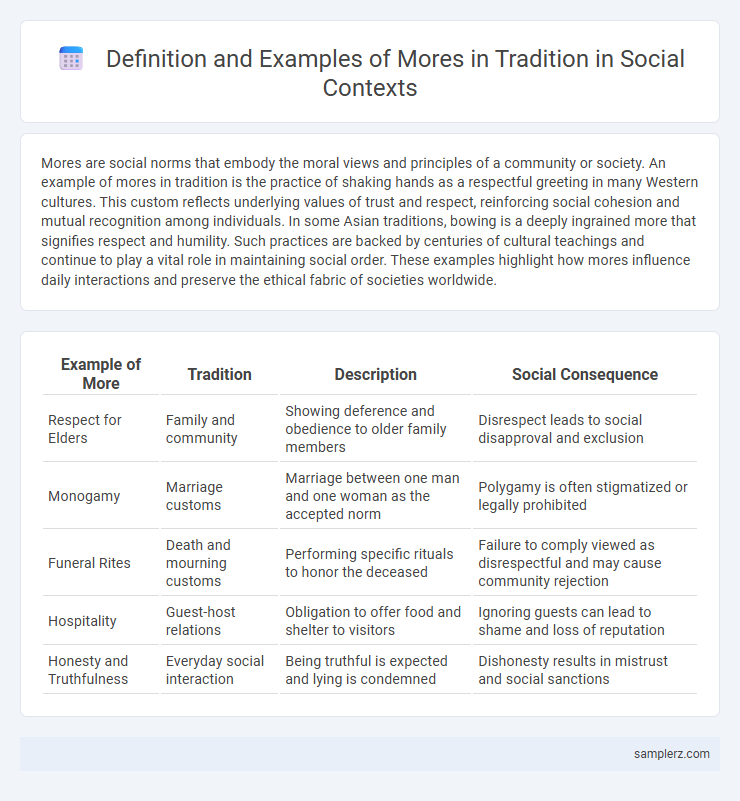Mores are social norms that embody the moral views and principles of a community or society. An example of mores in tradition is the practice of shaking hands as a respectful greeting in many Western cultures. This custom reflects underlying values of trust and respect, reinforcing social cohesion and mutual recognition among individuals. In some Asian traditions, bowing is a deeply ingrained more that signifies respect and humility. Such practices are backed by centuries of cultural teachings and continue to play a vital role in maintaining social order. These examples highlight how mores influence daily interactions and preserve the ethical fabric of societies worldwide.
Table of Comparison
| Example of More | Tradition | Description | Social Consequence |
|---|---|---|---|
| Respect for Elders | Family and community | Showing deference and obedience to older family members | Disrespect leads to social disapproval and exclusion |
| Monogamy | Marriage customs | Marriage between one man and one woman as the accepted norm | Polygamy is often stigmatized or legally prohibited |
| Funeral Rites | Death and mourning customs | Performing specific rituals to honor the deceased | Failure to comply viewed as disrespectful and may cause community rejection |
| Hospitality | Guest-host relations | Obligation to offer food and shelter to visitors | Ignoring guests can lead to shame and loss of reputation |
| Honesty and Truthfulness | Everyday social interaction | Being truthful is expected and lying is condemned | Dishonesty results in mistrust and social sanctions |
Defining Mores in Social Traditions
Mores are deeply ingrained social norms that dictate acceptable behavior within traditions, such as respecting elders or observing religious rituals. These unwritten rules shape communal values and reinforce moral standards essential for social cohesion. Violating mores often results in social sanctions or ostracism, underscoring their critical role in maintaining cultural continuity.
The Role of Mores in Shaping Culture
Mores such as respect for elders, hospitality, and ritual ceremonies deeply influence social interactions and community cohesion in cultural traditions. These unwritten norms enforce moral behavior and maintain social order by guiding acceptable conduct within societies. The role of mores in shaping culture is evident in how collective values are preserved and transmitted across generations, reinforcing identity and shared heritage.
Traditional Marriage Customs as Mores
Traditional marriage customs exemplify mores by enforcing cultural norms that dictate acceptable behavior and social roles during weddings. Practices such as arranged marriages, dowry exchanges, and ritual ceremonies reinforce community values and maintain social cohesion. Deviations from these customs often result in social sanctions, highlighting their significance in preserving tradition.
Mourning Practices Across Societies
Mourning practices across societies reveal distinct mores that govern grief expression, such as wearing black in Western cultures or observing extended periods of silence in some Asian communities. These customs underscore deeply ingrained social norms regarding respect for the deceased and the community's collective emotional support. Differences in rituals, like the Day of the Dead in Mexico versus the Muslim practice of three days of intense mourning, exemplify culturally specific expectations surrounding death and remembrance.
Respecting Elders: A Universal More
Respecting elders is a fundamental more deeply embedded in many traditions worldwide, reflecting cultural values of wisdom and authority. In societies across Asia, Africa, and Indigenous communities, this practice governs social interactions, ensuring elders receive honor and deference. Observing this more strengthens family bonds and preserves cultural heritage through intergenerational respect.
Rituals of Hospitality and Social Etiquette
Rituals of hospitality exemplify mores by requiring hosts to warmly welcome guests through specific actions such as offering food, drink, and comfortable seating, reinforcing respect and generosity within the community. Social etiquette in these traditions often dictates formal greetings, proper dress codes, and appropriate conversation topics, which maintain harmony and mutual respect. These unwritten rules are deeply embedded in cultural identity and guide behavior to preserve social cohesion.
Dress Codes as Reflections of Mores
Dress codes in traditional societies serve as clear reflections of cultural mores, indicating respect, modesty, and social status. For example, the sari in India symbolizes modesty and cultural heritage, while the kimono in Japan reflects values of elegance and formality. These dress codes enforce social norms and help maintain group identity within the community.
Religious Observances as Social Mores
Religious observances such as attending weekly worship services, fasting during sacred periods like Ramadan or Lent, and participating in ceremonial rites function as social mores that reinforce communal values and collective identity. These practices dictate expected behavior within a society, promoting social cohesion and moral conformity by linking spiritual beliefs with everyday conduct. Violations of these religious mores often result in social sanctions, reflecting their critical role in maintaining traditional social order.
Taboos and Forbidden Behaviors
In many traditional societies, mores strictly prohibit behaviors such as incest, theft, and desecration of sacred objects, reinforcing social cohesion and moral order. Taboos like forbidding the consumption of certain animals or discussing death openly serve to maintain cultural identity and respect communal values. Violating these forbidden behaviors often results in social sanctions or ostracism, emphasizing their critical role in preserving tradition.
Intergenerational Transmission of Mores
Intergenerational transmission of mores preserves cultural norms such as respect for elders, filial piety, and communal responsibility within families and communities. These deeply ingrained social rules guide behavior and maintain societal cohesion by passing established values from grandparents to parents and grandchildren. This process ensures continuity of tradition while adapting subtly to changing social contexts.

example of mores in tradition Infographic
 samplerz.com
samplerz.com